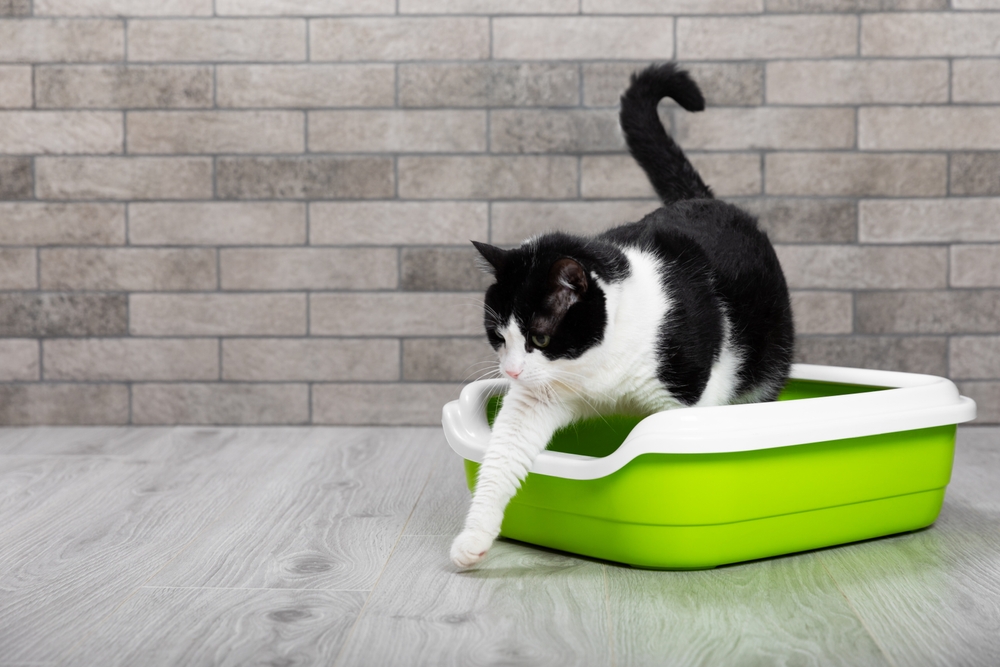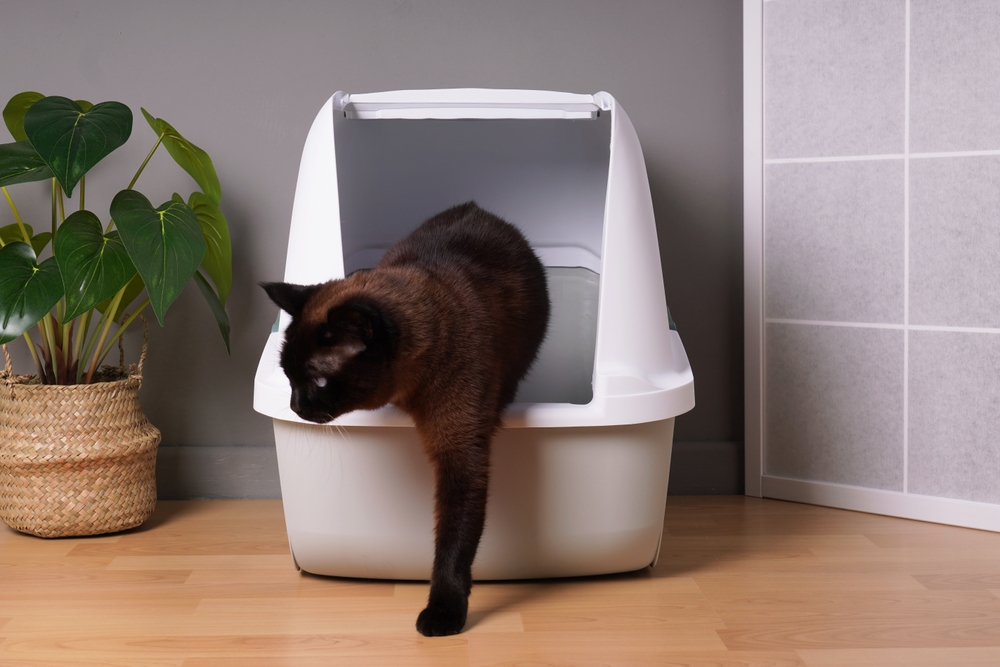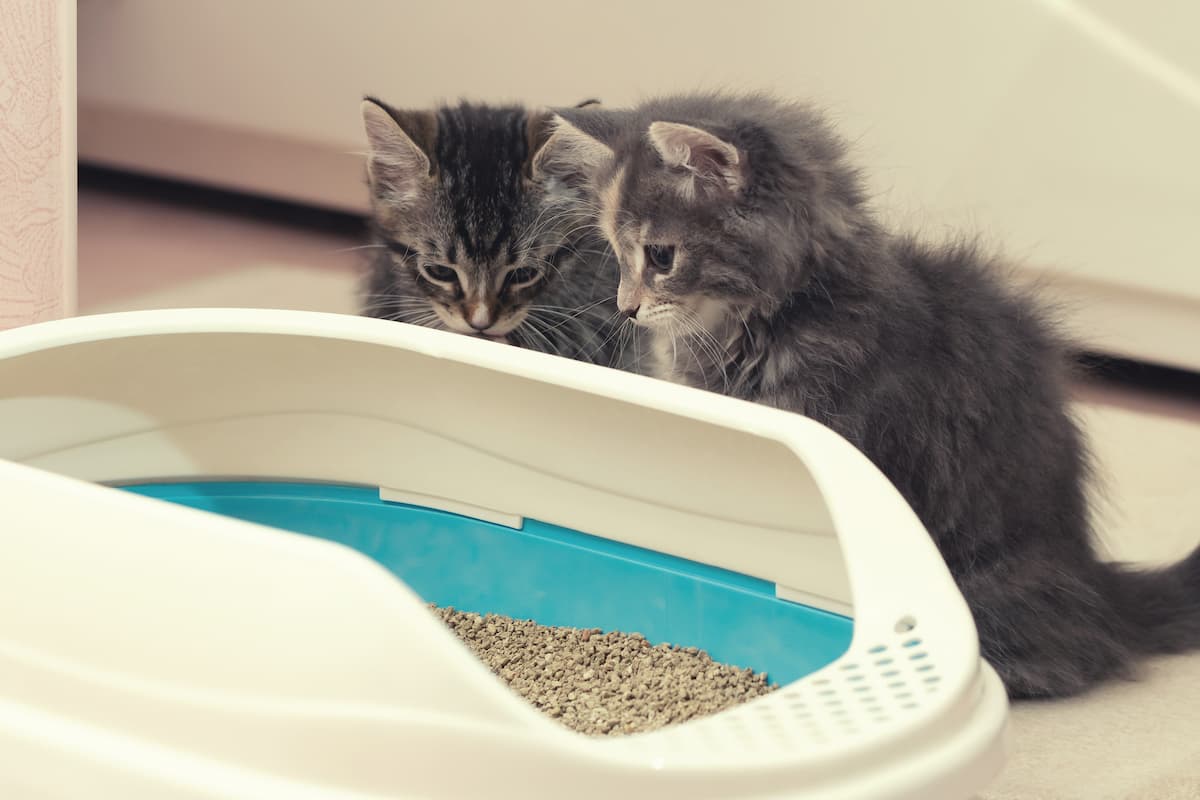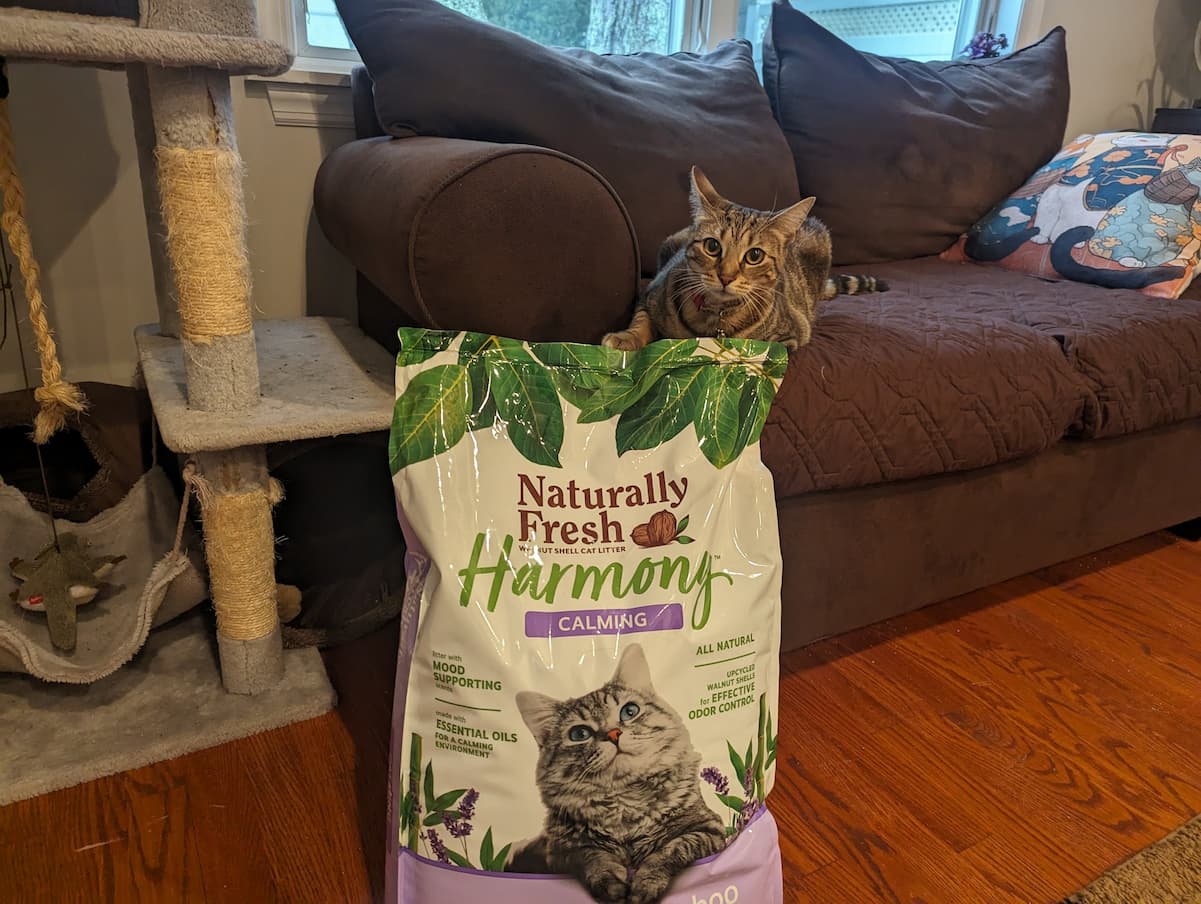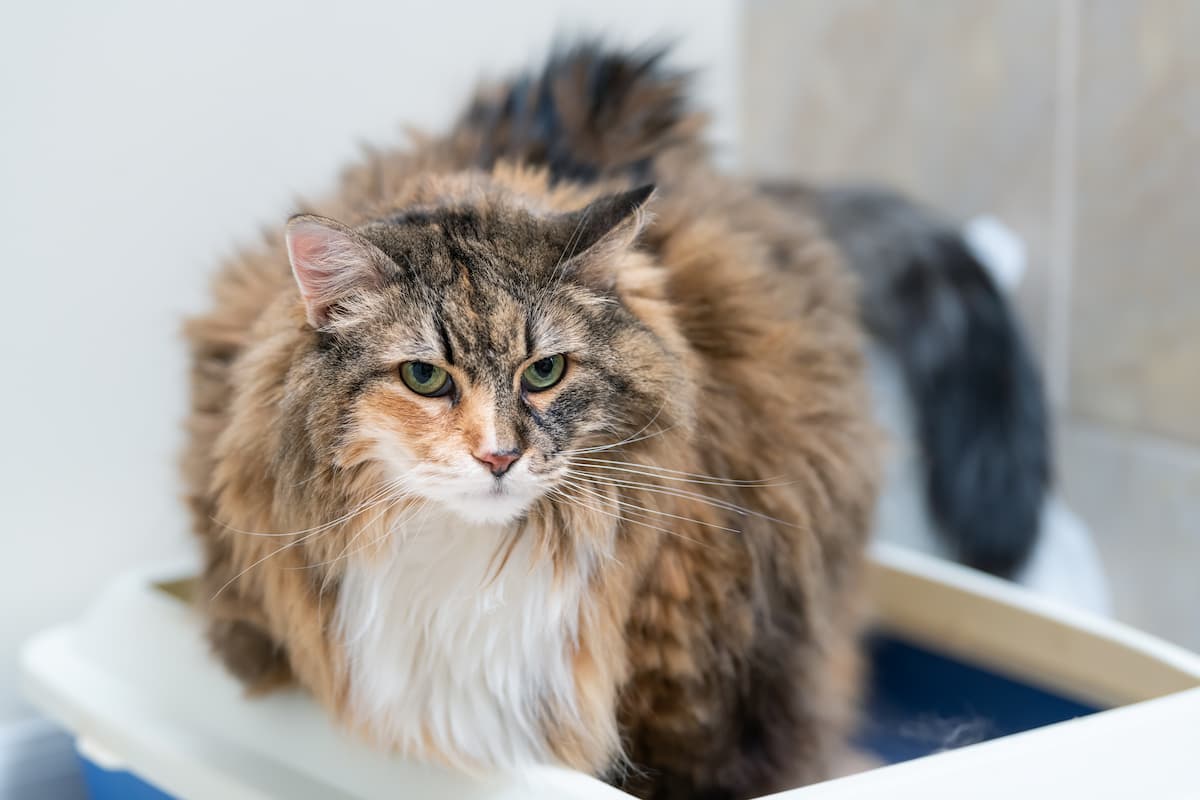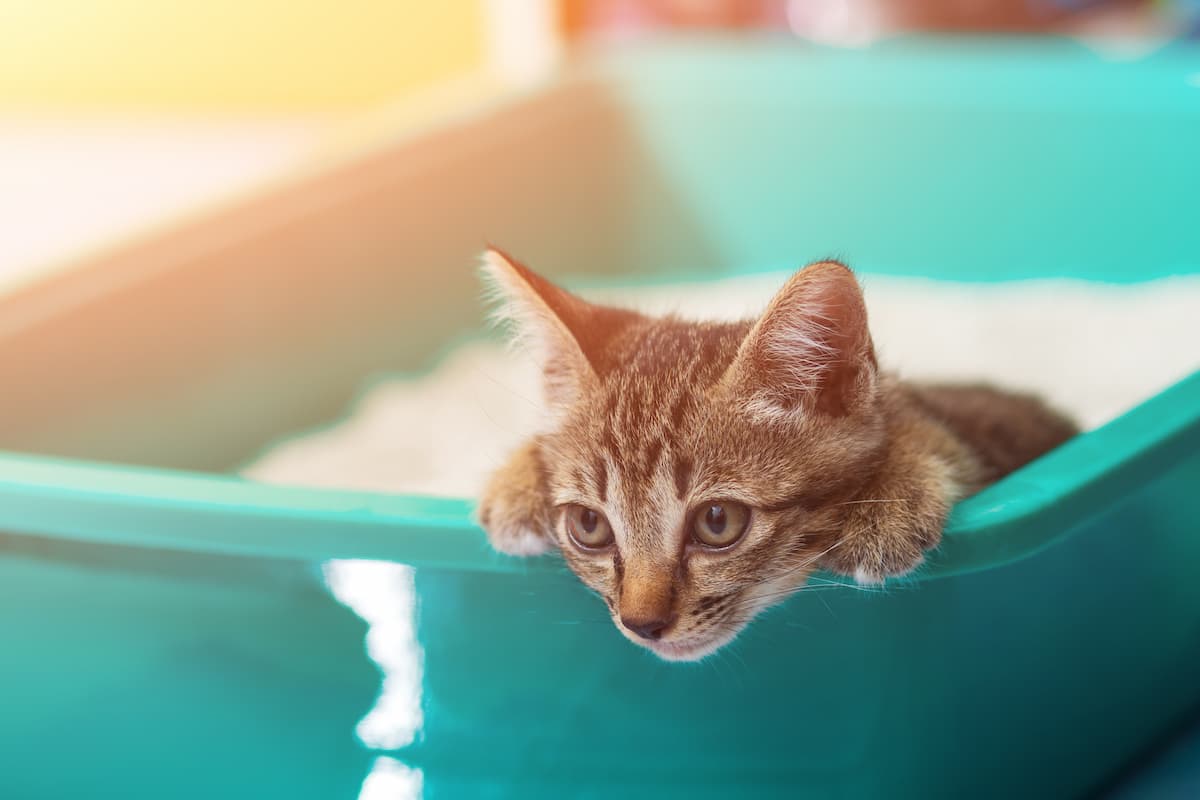6 Best Non-Clumping Cat Litters of 2025
Updated on April 24, 2024
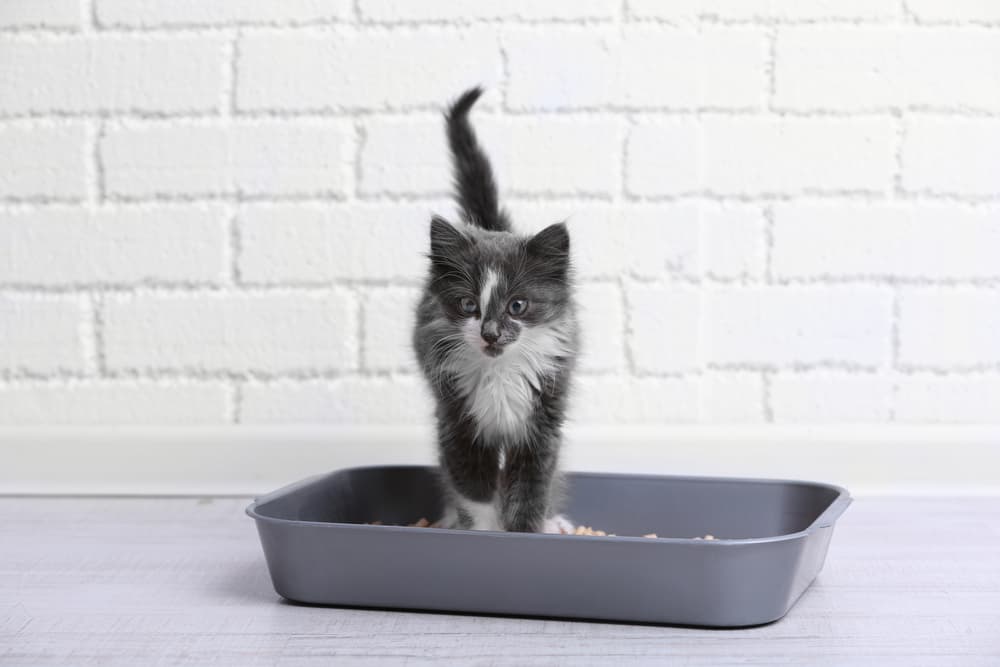
Choosing a cat litter that appeals to both you and your feline can be a challenge. While you might be in the market for a brand that makes cleanup easier, your cat could have strong feelings about the litter’s smell and texture.
If your cat avoids their litter box, it can be their way of telling you they don’t like how it feels on their paws, or they might find the scent of the litter offensive.
So, what’s a cat owner to do? With so many different selections of cat litter to choose from, finding one that you and your cat both like can be a little intimidating.
In the search for the perfect litter, Dr. Carly Fox, senior veterinarian at Schwarzman Animal Medical Center in New York, says it’s important to take several factors into consideration.
“Think about things like litter maintenance (how often do you want to scoop?), odor, absorbency, and cost,” Fox explains. “For kittens, or eco-conscious owners, non-clumping litter might be the best bet.”
Our Top Picks
All featured products are chosen at the discretion of the Vetstreet editorial team and do not reflect a direct endorsement by the author. However, Vetstreet may make a small affiliate commission if you click through and make a purchase.
- Overall Best Non-Clumping Cat Litter: Ultra Micro Crystals Cat Litter
- Best for Multiple Cats: Purina Tidy Cats 24/7 Scented Non-Clumping Clay Cat Litter
- Best Value: Fresh Step Non-Clumping Premium Scented Cat Litter
- Best Natural Non-Clumping Cat Litter: Skoon All-Natural Cat Litter
- Best Deodorizing Non-Clumping Cat Litter: Feline Pine Platinum Non-Clumping Cat Litter
- Best Non-Clumping Litter for Kittens: CatSpot Non-Clumping Coconut Cat Litter
6 Best Non-Clumping Litter Picks of 2025
You never quite know how a kitty is going to react to a new litter, but here are some of the best non-clumping cat litters that even finicky felines seem to find “purr-fect.”
Overall Best Non-Clumping Cat Litter
Our Pick: Ultra Micro Crystals Cat Litter
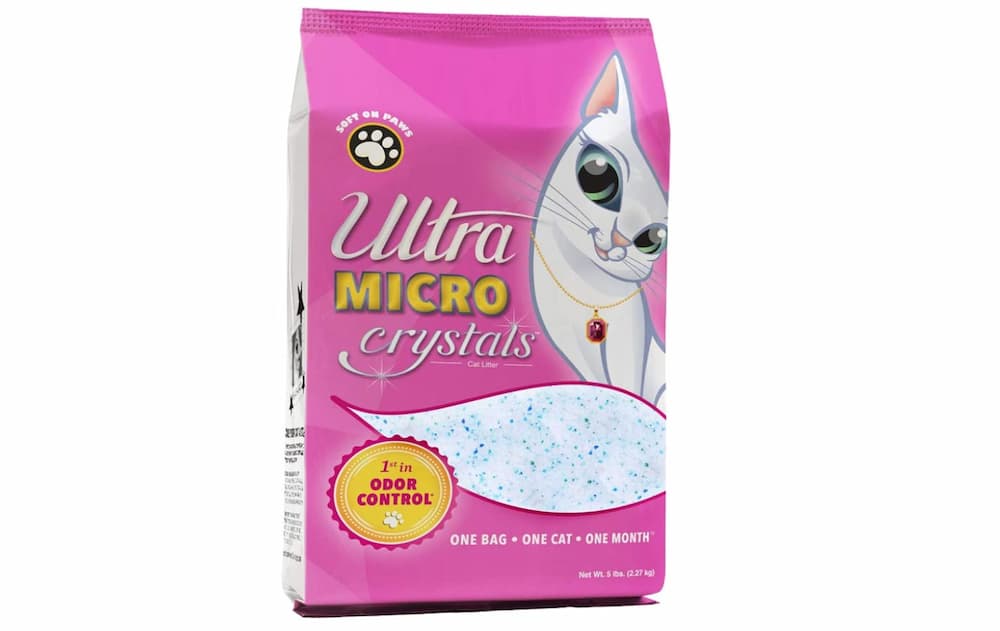
If you’re looking for a non-clumping litter to make your life easier, Ultra Micro Crystals Cat Litter checks all the boxes. It’s odor free and gentle on your cat’s paws, and it offers instant liquid absorption for easy cleanup. Made with sand-like silica gel crystals that are lightweight, virtually dust-free, and long-lasting, this litter absorbs moisture and traps odors really well, which means it gets a thumbs (or paws) up from both cats and their owners.
Pros
- Non-toxic and safe for cats
- Less messy than clay litter
- Crystals can be raked and used again for up to a month
- One 5 lb bag is estimated to be enough for one cat for one month
Cons
- Some customers found that it produced a good amount of dust
- Higher price point
Best Non-Clumping Cat Litter for Multiple Cats
Our Pick: Purina Tidy Cats 24/7 Scented Non-Clumping Clay Cat Litter
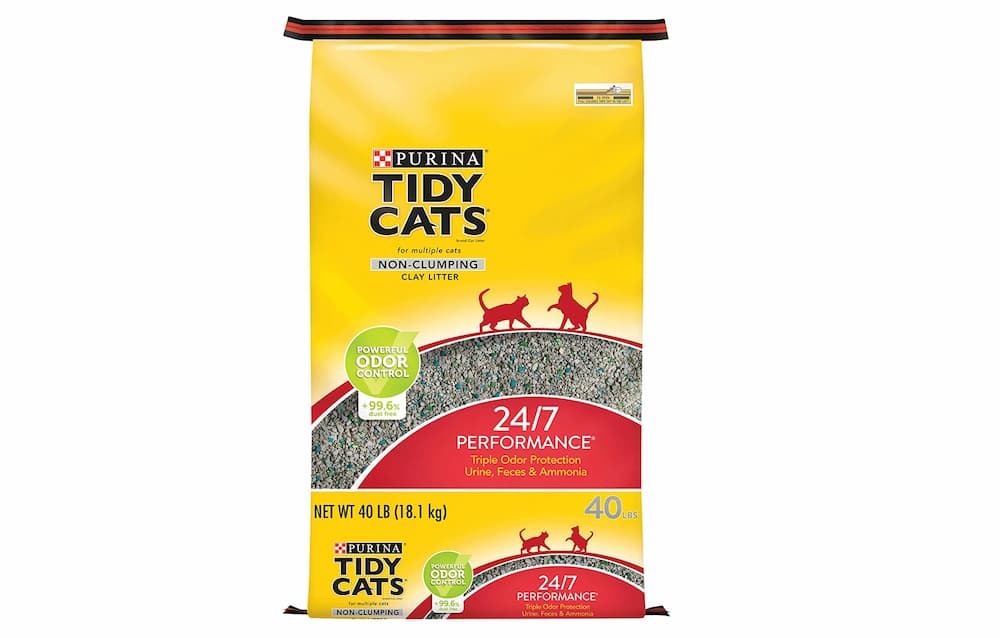
A hardworking cat litter that can hold up to more than one kitty, Purina’s Tidy Cats non-clumping clay cat litter is our pick for combating odors in multi-cat households. Its extended-release deodorizing system offers triple-odor protection to ward off urine, feces, and ammonia smells on a continuous basis. Plus, it’s super absorbent and almost 100% dust-free for less mess.
Pros
- 99.6% dust free
- Available in a variety of bag sizes
- Lightweight
- Good option if you prefer to change the litter box rather than scoop
- Great price point
Cons
- Some customers were not fond of the scent
Best Value Non-Clumping Cat Litter
Our Pick: Fresh Step Non-Clumping Premium Scented Cat Litter
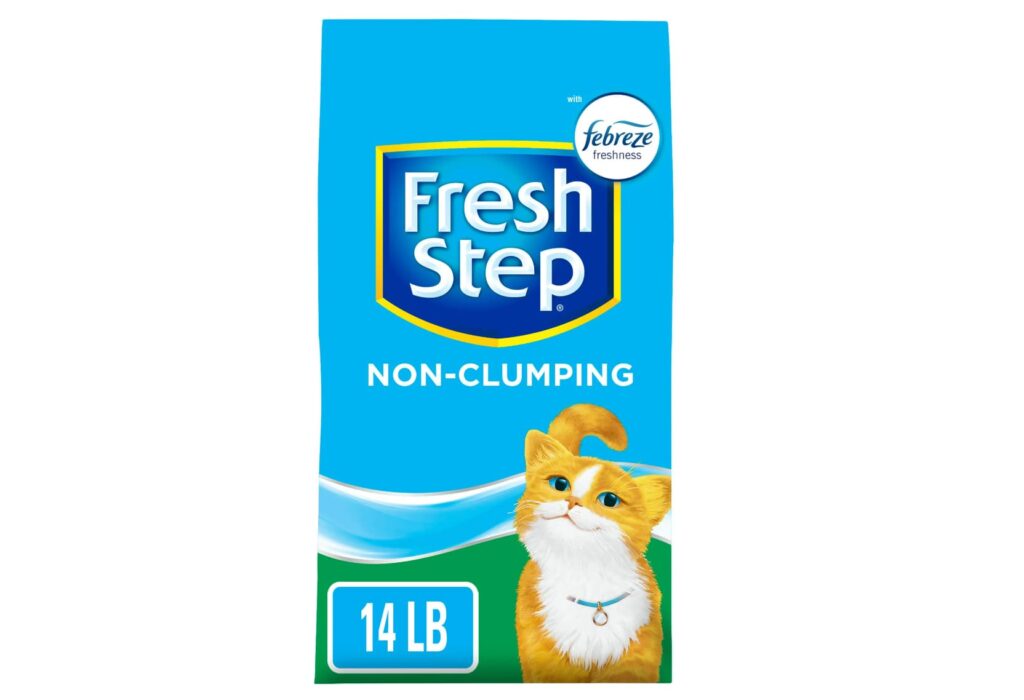
A household name in the cat litter world, Fresh Step offers quality products that get the job done, like this non-clumping variety. Made with Febreze to provide a fresh scent with every step of the paw, this low-dust clay litter delivers 7-day odor control to keep smells completely contained. Many customers rave about its lasting capabilities, which allow them to go longer in between litter cleanings without the stench. It’s not the cheapest litter on our list, but it does come in at a good price for the enduring value it provides.
Pros
- Made with Febreze for a paw-activated fresh scent
- 7-day odor control
- Customers said it requires less changing than other brands
- Low-dust formula
- Good price point
Cons
- Some customers noted that this litter tracked more
- The scent may not be for everyone
Best Natural Non-Clumping Cat Litter
Our Pick: Skoon All-Natural Cat Litter
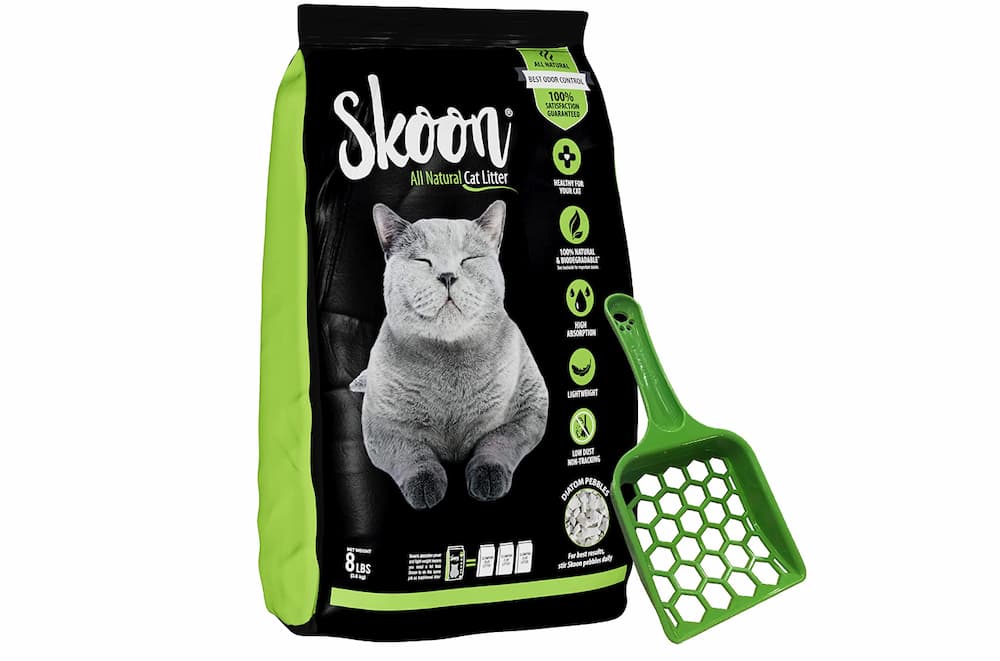
If you want to reduce your cat’s carbon pawprint, this all-natural product gets high marks. Customers say Skoon effectively traps odors and combats dust, all while being eco-friendly. Made of diatom pebbles, Skoon’s unique formula is so absorbent that you can use less litter and save money. Families can also rest easy knowing that Skoon is non-toxic.
Pros
- Lightweight and highly absorbent
- Non-toxic and hypoallergenic
- Low dust to eliminate tracking
- Makes solid waste easy to scoop
- Customers say it works well in multi-cat households
- Unscented, lemon, and lavender options
Cons
- Some reviewers say wet litter gathers at the bottom of the box
- Higher price point
Best Deodorizing Non-Clumping Cat Litter
Our Pick: Feline Pine Platinum Non-Clumping Cat Litter
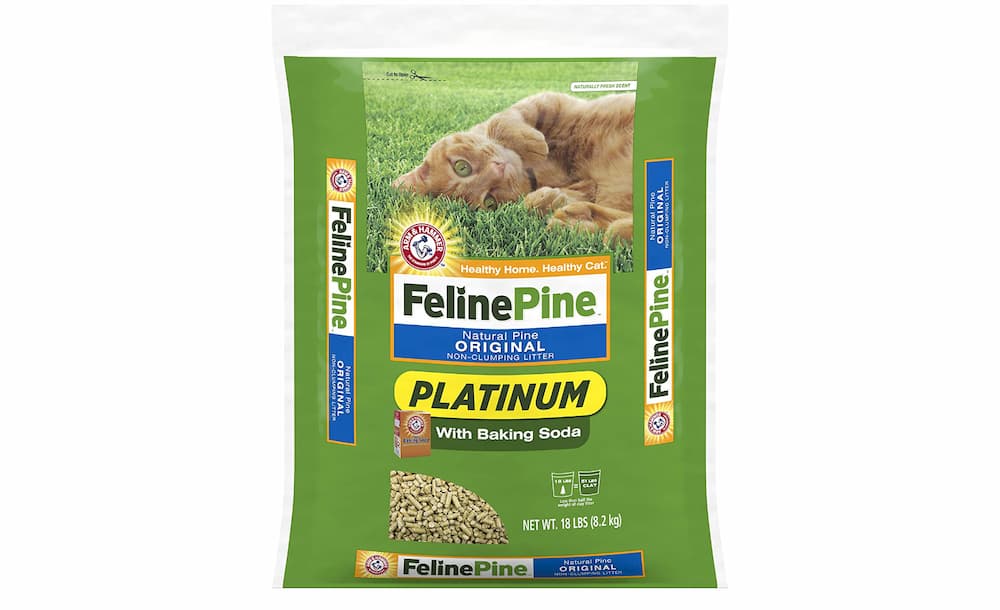
Arm & Hammer products are known as a household staple, and their non-clumping cat litter is no exception. The fresh pine scent controls odors effectively without added fragrances and chemicals, and the highly absorbent pine pellets soak up liquid and lock away ammonia odors. Since cats are naturally attracted to the smell of fresh pine, you won’t need to bribe your feline to use their litter box. The litter’s natural scent and low-dust design benefits both cats and their owners who may be allergic or sensitive to smells. Plus, its lightweight consistency makes cleaning up after your cat a breeze.
Pros
- Highly absorbent, compostable pine pellets
- No harsh chemicals
- Half the weight of clay litter, making for easier disposal
- Pellets turn to sawdust when wet for easy sifting
- Non tracking and low dust
- Sustainable manufacturing process means no trees are cut down to make this litter
Cons
- Some reviewers felt it didn’t work well in a multi-cat home
- Some customers found the sawdust hard to clean
Best Non-Clumping Litter for Kittens
Our Pick: CatSpot Non-Clumping Coconut Cat Litter
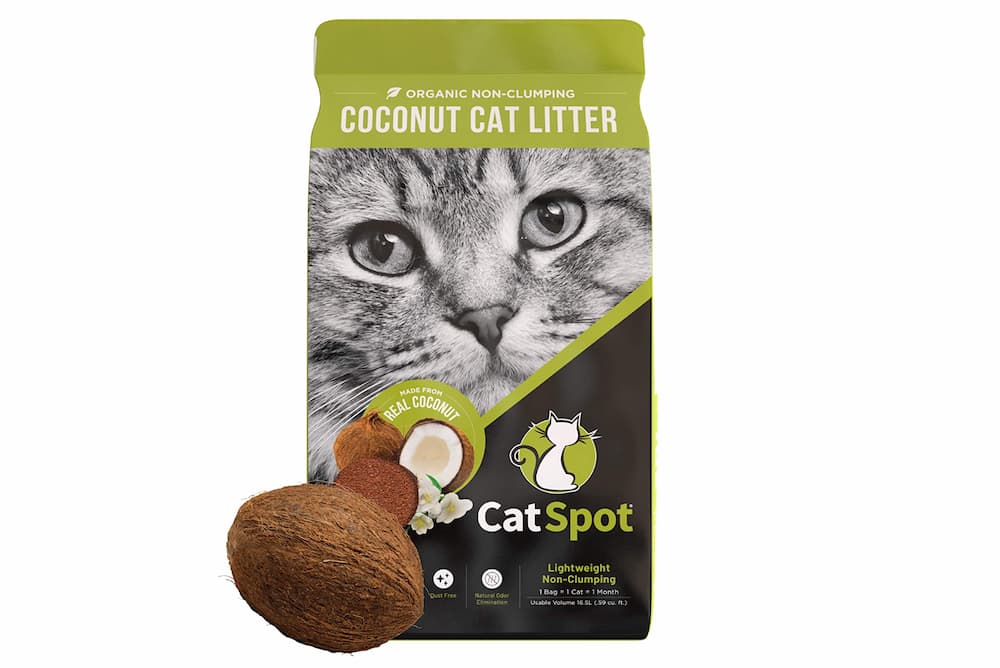
We all want to give adorable itty-bitty kitties the best possible start in life, and CatSpot makes that easy with their organic, all-natural, non-clumping cat litter, made from coconut. Since kittens, and even some cats, are prone to eating litter, CatSpot shuns harmful chemicals and uses shaved bits of coconut shells. You can feel good knowing that if your kitten manages to eat a bit of CatSpot when you’re not looking, it won’t cause digestive problems or result in an unplanned trip to your veterinarian.
Pros
- Unscented, absorbent, and easy to clean
- Lightweight and dust free
- Great for those with allergies
- No clumping agents, chemicals, or toxic clay
- Flushable or can be emptied in your yard or compost bin
- A 5 lb bag of CatSpot is said to have the same absorbency as a 20 lb bag of clay litter
Cons
- Some reviewers mentioned that it tracked
- Higher price point
Clumping vs. Non-Clumping Cat Litter
Cat litter comes in two main forms: clumping and non-clumping. With clumping litter, a cat’s waste “clumps” together, making it easier to clean. Non-clumping cat litter has good moisture-absorbing capabilities, allowing it to effectively remove the odor of cat urine, but since the litter soaks the urine up (rather than forming into clumps), you may need to change your cat’s litter box more often.
Many cat owners find that clumping cat litter is simpler to scoop and streamlines the clean-up process since you don’t need to get rid of the contents of the entire litter box.
On the flip side, some cats can ingest clumps, resulting in intestinal blockage or choking, making non-clumping litters appealing from a safety perspective.
Clumping cat litter is made from clay or silica gel crystals, while non-clumping cat litter can be made with clay, crystals, or a plant-based alternative such as pine, corn, wheat, or wood.
Non-clumping litter tends to be more lightweight and absorbent, and better for the environment. “Certain types of non-clumping litter are more eco-friendly due to the materials they are made from,” says Dr. Fox. “For example, non-clumping litter made from corn, recycled newspaper or wood shavings is biodegradable/compostable.”
“Non-clumping litter also has less daily maintenance since there is no scooping of waste,” continues Fox. “It’s also best for kittens who tend to be curious and often eat their litter. This behavior typically resolves by the time they reach 6 months – so ideally, non-clumping litter should be used with young kittens, as it’s less likely to cause an intestinal obstruction.”
Other Benefits of Non-Clumping Litter:
- Typically less expensive than clumping litter
- Tends to be less dusty and lower tracking
- Ideal for cats who won’t use the litter box if there are clumps
How We Ranked Our Non-Clumping Litter Picks
We spoke to veterinarians and cat owners to find the best non-clumping cat litters on the market, taking into consideration the following factors:
Convenience/cleaning. One of the main things cat parents look for when purchasing cat litter is how easy it is to maintain, clean, and dispose of, so we made sure to call this out whenever possible.
Safety. We understand that in addition to a cat litter that’s convenient, you also want one that won’t be harmful to your kitty, which is why we took note of any safety info for each pick.
Ratings/reviews. Having the stamp of approval from other pet parents is huge when it comes to making a pet purchase, so we ensured that all of the products on our list received at least a 4-star rating and primarily positive comments.
Value. Cat litter is something that you’ll be buying for your kitty’s entire life, and finding the perfect balance of price and performance is key. With that in mind, we highlighted which litters will give you the most bang for your buck.
Non-Clumping Cat Litter Buyer’s Guide
Now that we’ve covered some of our favorite non-clumping cat litters, let’s go over a few things to consider as you’re choosing one.
Ingredients. Depending on your needs/ preferences, consider the ingredients that are in the cat litter you’re purchasing. “For specific ingredients, if odor control is a priority, look for a formula that contains deodorizers such as baking soda,” says Rachel Geller, Ed.D., cat behaviorist and president/founder of All Cats All the Time, Inc.
Materials. Since allergies can be an issue with certain types of non-clumping cat litter, be sure to select one that won’t irritate you or your kitty. “Some people and some cats have problems with the dust, so look for a natural non-clumping cat litter that is low dust or dust-free,” recommends Geller. “Natural cat litter made from materials like recycled paper tends to be less dusty than clay litters. Other dust-free options are pine, corn, wheat, beet pulp, walnut shells and wood.”
Number of cats. According to Geller, non-clumping cat litter is an excellent choice for multi-cat households. “Non-clumping litter is excellent at controlling cat urine odors because it absorbs large amounts of urine, making the cats more likely to use it,” she explains. “An absorbent litter is particularly important for litter in a multi-cat household. Of course, you still need to follow the litter box rule of having one more box than the number of cats you have.”
Your litter box. While non-clumping cat litter works well with most boxes out there, Geller warns against using it if you have an automatic or self-cleaning box. “Automatic litter boxes work best with clumping litters, so urine and poops can be easily separated and sifted away.” If you do have an automatic litter box but are interested in trying non-clumping cat litter, you’ll probably want to grab a different box along with it.
Non-Clumping Cat Litter FAQs
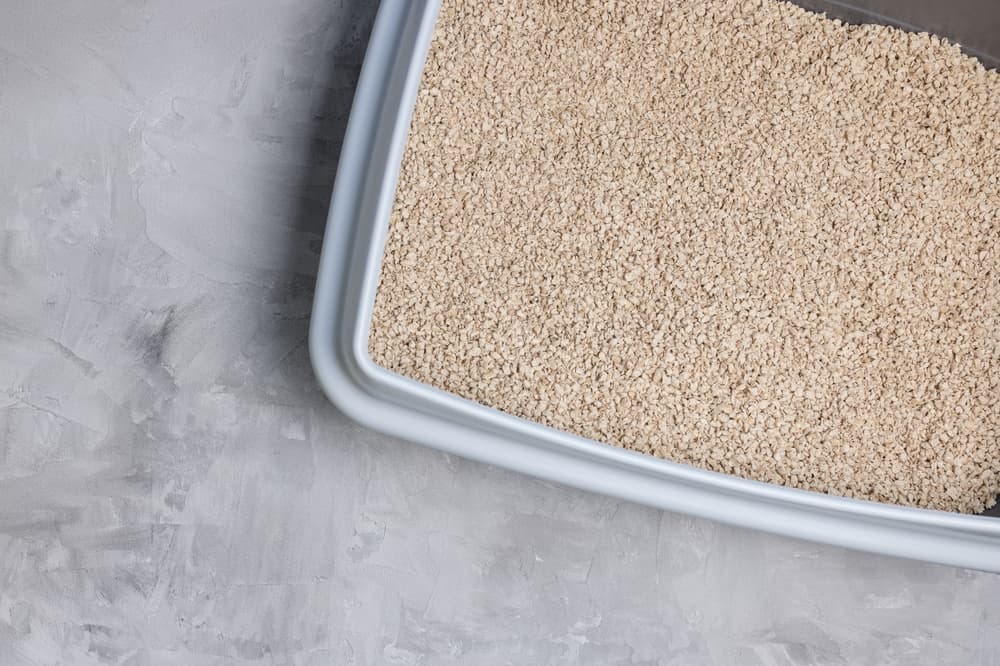
Still have questions about non-clumping cat litter? No problem! We’ve rounded up a few of our most frequently asked to leave you as informed as possible.
How should you clean non-clumping cat litter?
When it comes to cleaning your non-clumping litter, Geller says consistency is key. “I recommend scooping the solid poops from the non-clumping litter daily, or more if you are home and see there is a poop. To clean pee from non-clumping cat litter, change out the litter entirely and wash out the box with soap and water once a week.”
However, every cat is different, so it’s important to adjust based on your own situation. “This time frame may change based on how many cats are in the household, how many litter boxes you have, [whether] the cats prefer one box/location over another, and your cat’s personal routines.”
Can you flush non-clumping cat litter?
While some non-clumping cat litter may technically be marketed as flushable, Geller generally warns against it for the health of your pipes and your local water. “Some types of litter can absorb up to 15 times its weight in pee, which becomes heavy and blocks the pipes and sewer,” she says. “Cats carry the Toxoplasma Gondii parasite, which can infect humans, particularly in pregnancy. Flushing any cat litter down the toilet, clumping or non-clumping, can potentially introduce this parasite into the community water supply and infect other people, as well as marine life.
Do cats prefer clumping or non-clumping cat litter?
According to Geller, though many studies have been done, there’s no clear cut answer to this one. “My philosophy is to use what your cat likes. In almost every study, the conclusion usually states what most cats like. But, this means there is a minority of cats that likes something else – and you may have one of those cats in the minority.”In order to get a better idea of what your cat may prefer, Geller says you can put a few options to the test. “Have two boxes, side by side, one with clumping litter and one with non-clumping litter. Scoop both boxes daily at the same time. You want the only difference to be the litter, so the location, size of the box, covered vs uncovered, frequency and time of cleaning should all be identical. Note which box gets used the most and you will have your answer as to what your cat prefers.”

